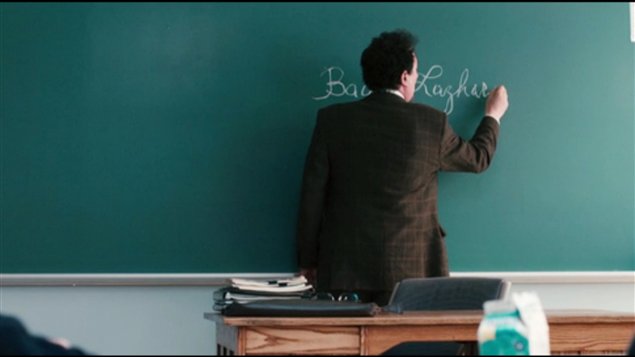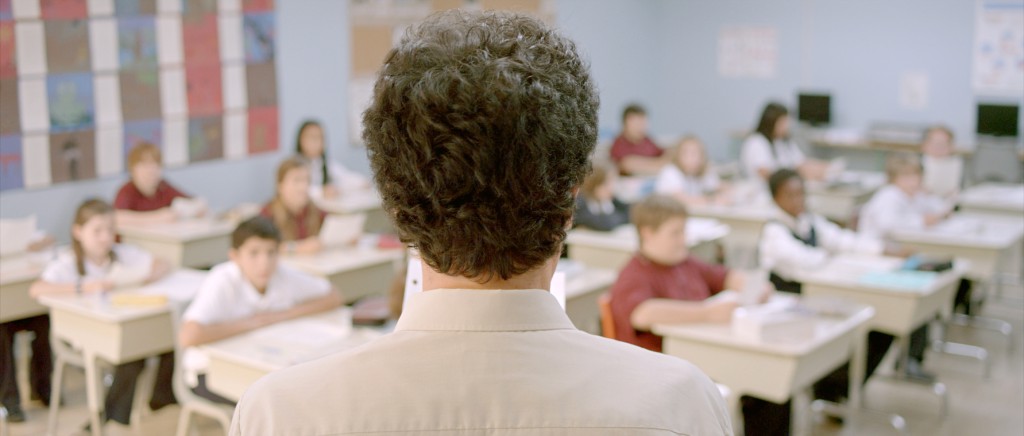Written by Philippe Falardeau (based on play by Évelyne de la Chenelière)
Directed by Philippe Falardeau
Canada, 2011
Recent years have seen a tectonic shift in how the homegrown Canadian citizens understand, perceive, interact with newcomers whose origins lie in the Middle East and Maghreb. Blame the media, blame misunderstandings, blame racism, blame frightful activities transpiring in the countries of origin of said immigrants and that has, as recently as the fall of 2014, even hit Canadian soil. New Canadians of Arab descent are, often despite themselves, given the spotlight in the news and various other forms of media for less than enviable reasons. What is it like, therefore, being a newcomer in Canada with ties to a region of the globe that has been earning the worst of reputations since September of 2001? The 2011 Academy Award nominated film from director Philippe Falardeau, Monsieur Lazhar, takes a glance at the experience and so much more, such as the reality that pain and suffering is felt by everyone, irrespective of national and ethnic origin.
When their 6th grade teacher is found dead in a classroom one morning after having hung herself, the schoolboys and schoolgirls of a Montreal elementary institution are left in a state of shock, as are the people running the place. In a mad scramble to find a replacement suitable enough to carry over until the end of the year and support the children, the school’s director, Mme Vaillancourt (Danielle Proulx) hires Bachir Lazhar (Mohamed Saïd Fellag), a man of Algerian descent who has just recently arrived. He purports to having taught back in his native land for the better part of two decades. Willing to start work immediately, the school is just desperate enough to give him a chance. What they do not know however is that the titular Monsieur Lazhar is just as desperate to earn refugee status in Canada following tragic events back in Algeria that have robbed him of his family. Having both experienced loss, Lazhar and his students, among them the bright, mature Alice (Sophie Nélisee) and the troublesome Simon (Émilien Néron), will learn to start a new chapter of their lives together.
Based on a play by Évelyne de la Chenelière, Falardeau’s film is sophisticated in its approach for dealing with a multitude of terrifyingly sensitive subjects, among them children dealing with death, immigration procedures and the unification of disparate cultures for harmonious purposes. Refusing to paint with broad strokes, it broaches these topics with a touch of class and intelligence, revealing a sense of maturity that should be a prerequisite for any movie tackling these ideas. Monsieur Lazhar works primarily because it puts trust in its own characters and in the audience to accept and understand the difficult circumstances depicted. That said, the film’s tone is not overly bleak. Peeking its head around every corner is hope: hope that the coming times will be brighter, that they will bring with them love, security and the strength to carry on and start anew. An extraordinarily difficult balance act to achieve, Monsieur Lazhar accomplishes it, almost effortlessly so.
Through the tragedies the protagonist and his students have recently faced, each side is put in a situation where they must come together. Two characters come more clearly into focus at this point, one being of course Bachir Lazhar, the other Alice, clearly the sharpest student in the class. She is curious about the world, is open to learning new things from different people. Whereas most of her classmates roll their eyes or express annoyance at Lazhar’s methods (the difficulty level of his attempts to test the students’ skills far surpass that of his predecessor), Alice seems to accept the challenge. She, more so than any of the other children, is willing to accept Lazhar as the new teacher. This acceptance is crucial both for him and Alice herself. As a relatively new arrival battling with immigration laws, Alice’s simple open mindedness means the world to Lazhar. For Alice, her flight attendant mother (played by the original playwright) is frequently absent, thus making Lazhar something of a constant figure of support in her life. Strict though he may be in his dictations and lessons, he is nonetheless a force of reassurance, and a kind man.
Lazhar’s struggles are just as taxing as those of the younglings coping with tragedy. For one, he was never a teacher back in Algeria, therefore his placement in the classroom means he has to put into practice whatever he learned from his deceased wife who was the real teacher in the family. More importantly, his coping with a new lifestyle in Canada (and Montreal winters) is continuously threatened by his entanglements with Immigration Canada, who request hearings to determine why he left Algeria before granting him any sort of permanent status. His battle, therefore, is fought on two fronts: in the classroom and with the government of his country he hopes to call his adoptive home soon enough. On the one hand he must prove to official representatives the legitimacy of his claims of needing to stay whereas on the other hand he must prove his worth in the eyes of the people already living the land. It’s this duality that provides Monsieur Lazhar with that extra layer of thematic texture. Even by focusing on a single aspect of the protagonists struggles, the movie would still have had a compelling premise, but by adding the tangential subplots Falardeau’s picture actually comes into to greater focus rather than getting bogged down in plot.
The film certainly echoes loudly in modern Canadian and Quebec society. It was only a few years ago that the Bouchard-Taylor commission on ‘reasonable accommodations’ to be made to religious minorities communities in the province of Quebec made public what most already knew very well, that even in the early 21st century, even in a relatively open country such as Canada, people have a long way to go before claiming that they have fully traversed the road towards equality. Monsieur Lazhar is the sort of film that reminds its viewer that change, all sorts of change, be it a new teacher or a new country, can be a good thing if one is simply willing to go along with it. The film rarely makes any explicit commentary about the protagonist’s cultural background and on the few occasions that it does, it is only related to his hearings with the immigration officers, never the classroom. As such, the picture understands the aspects to Lazhar worth exploring and those that would only produce forced, artificial drama.
Monsieur Lazhar carried with it tremendous critical momentum in late 2011 and into 2012, so much so that it earned a nomination as one of the best foreign language films at that year’s Academy Award ceremony. Its nomination occurred between the 2011 and 2013 ceremonies, when two other French Canadian films received nominations as well, Incendies in 2011 and War Witch in 2013. Of the three, Monsieur Lazhar is the easiest to digest, for its subject matter is, for the most part, the sweetest and most mainstream inclined. That said, it goes about telling its story and exploring its themes in impressively mature fashion, rarely taking any easy avenues that would otherwise dilute its potency. Both complex and simple at the same time, Monsieur Lazhar is exactly the sort of film the Canadian film industry can be extremely proud of.
-Edgar Chaput




